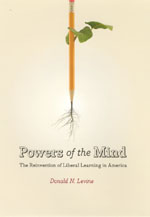Review: Levine, Powers of the Mind
 The current issue of the New York Review of Books is running an interesting article titled “Scandals of Higher Eduction” written by Andrew Delbanco, professor in the humanities and director of American studies at Columbia University. The article is the typical NYRB in-depth review of recent books, in this case offering varying critiques of the state of the American educational system, especially the higher educational system as it is embodied by the nation’s elite schools. Delbanco’s article draws on several books that rehash now commonplace critiques of flawed admissions policies that favor money over smarts. But he reserves a special place for former U of C dean Donald Levine’s new book, Powers of the Mind: The Reinvention of Liberal Learning in America; a work with an insightful approach that picks up where the others fall short in its incisive analysis of the state of higher eduction. Delbanco writes:
The current issue of the New York Review of Books is running an interesting article titled “Scandals of Higher Eduction” written by Andrew Delbanco, professor in the humanities and director of American studies at Columbia University. The article is the typical NYRB in-depth review of recent books, in this case offering varying critiques of the state of the American educational system, especially the higher educational system as it is embodied by the nation’s elite schools. Delbanco’s article draws on several books that rehash now commonplace critiques of flawed admissions policies that favor money over smarts. But he reserves a special place for former U of C dean Donald Levine’s new book, Powers of the Mind: The Reinvention of Liberal Learning in America; a work with an insightful approach that picks up where the others fall short in its incisive analysis of the state of higher eduction. Delbanco writes:
If…it is a scandal that so few disadvantaged students are able to attend our most advantageous colleges, it is also urgent, in the words (the italics are his) of Donald Levine, former dean of the college at the University of Chicago, to notice that
the scandal of higher education in our time is that so little attention gets paid, in institutions that claim to provide an education, to what it is that college educators claim to be providing.
In Powers of the Mind: The Reinvention of Liberal Learning in America, Levine has written a fascinating history of curricular debates at the University of Chicago, reaching back to its founding more than a century ago. It is a story of serious teachers responding to continuous change in the world and in their particular academic disciplines while always keeping in view the enduring goal of liberal education, which Levine succinctly calls “the cultivation of human powers.”
Drawing on his own lifetime of teaching and educational leadership at the University of Chicago, Levine’s book looks beyond the headlines to provide an intelligent critique of the American university system and offer a viable paradigm for liberal arts today.